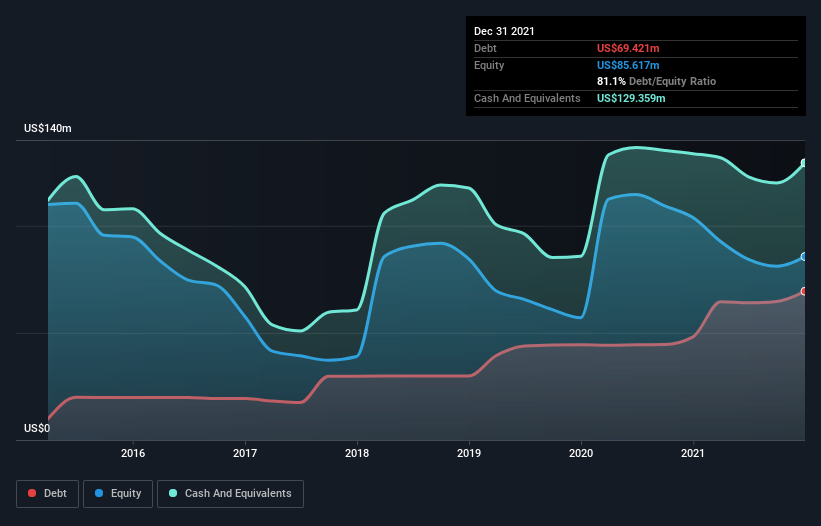
Some say volatility, rather than debt, is the best way to think about risk as an investor, but Warren Buffett famously said that 'Volatility is far from synonymous with risk.' So it might be obvious that you need to consider debt, when you think about how risky any given stock is, because too much debt can sink a company. Importantly, Cerus Corporation (NASDAQ:CERS) does carry debt. But is this debt a concern to shareholders?
When Is Debt Dangerous?
Debt is a tool to help businesses grow, but if a business is incapable of paying off its lenders, then it exists at their mercy. In the worst case scenario, a company can go bankrupt if it cannot pay its creditors. However, a more frequent (but still costly) occurrence is where a company must issue shares at bargain-basement prices, permanently diluting shareholders, just to shore up its balance sheet. Of course, the upside of debt is that it often represents cheap capital, especially when it replaces dilution in a company with the ability to reinvest at high rates of return. When we think about a company's use of debt, we first look at cash and debt together.
See our latest analysis for Cerus
How Much Debt Does Cerus Carry?
The image below, which you can click on for greater detail, shows that at December 2021 Cerus had debt of US$69.4m, up from US$48.1m in one year. However, its balance sheet shows it holds US$129.4m in cash, so it actually has US$59.9m net cash.

A Look At Cerus' Liabilities
According to the last reported balance sheet, Cerus had liabilities of US$78.6m due within 12 months, and liabilities of US$73.3m due beyond 12 months. Offsetting these obligations, it had cash of US$129.4m as well as receivables valued at US$25.1m due within 12 months. So these liquid assets roughly match the total liabilities.
This state of affairs indicates that Cerus' balance sheet looks quite solid, as its total liabilities are just about equal to its liquid assets. So it's very unlikely that the US$920.7m company is short on cash, but still worth keeping an eye on the balance sheet. Simply put, the fact that Cerus has more cash than debt is arguably a good indication that it can manage its debt safely. When analysing debt levels, the balance sheet is the obvious place to start. But ultimately the future profitability of the business will decide if Cerus can strengthen its balance sheet over time. So if you're focused on the future you can check out this free report showing analyst profit forecasts.
Over 12 months, Cerus reported revenue of US$131m, which is a gain of 42%, although it did not report any earnings before interest and tax. Shareholders probably have their fingers crossed that it can grow its way to profits.
So How Risky Is Cerus?
We have no doubt that loss making companies are, in general, riskier than profitable ones. And the fact is that over the last twelve months Cerus lost money at the earnings before interest and tax (EBIT) line. Indeed, in that time it burnt through US$35m of cash and made a loss of US$54m. However, it has net cash of US$59.9m, so it has a bit of time before it will need more capital. With very solid revenue growth in the last year, Cerus may be on a path to profitability. By investing before those profits, shareholders take on more risk in the hope of bigger rewards. The balance sheet is clearly the area to focus on when you are analysing debt. But ultimately, every company can contain risks that exist outside of the balance sheet. To that end, you should be aware of the 3 warning signs we've spotted with Cerus .
If you're interested in investing in businesses that can grow profits without the burden of debt, then check out this free list of growing businesses that have net cash on the balance sheet.
New: AI Stock Screener & Alerts
Our new AI Stock Screener scans the market every day to uncover opportunities.
• Dividend Powerhouses (3%+ Yield)
• Undervalued Small Caps with Insider Buying
• High growth Tech and AI Companies
Or build your own from over 50 metrics.
Have feedback on this article? Concerned about the content? Get in touch with us directly. Alternatively, email editorial-team (at) simplywallst.com.
This article by Simply Wall St is general in nature. We provide commentary based on historical data and analyst forecasts only using an unbiased methodology and our articles are not intended to be financial advice. It does not constitute a recommendation to buy or sell any stock, and does not take account of your objectives, or your financial situation. We aim to bring you long-term focused analysis driven by fundamental data. Note that our analysis may not factor in the latest price-sensitive company announcements or qualitative material. Simply Wall St has no position in any stocks mentioned.
About NasdaqGM:CERS
Excellent balance sheet and slightly overvalued.


